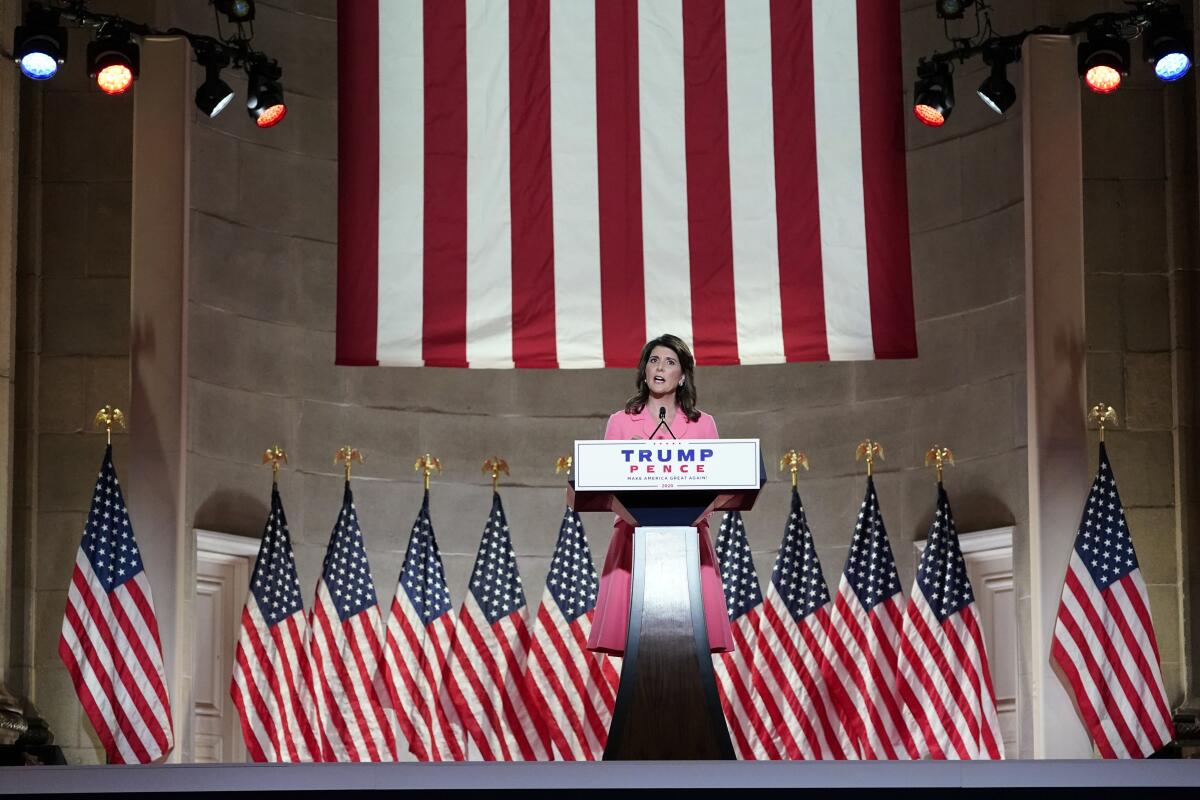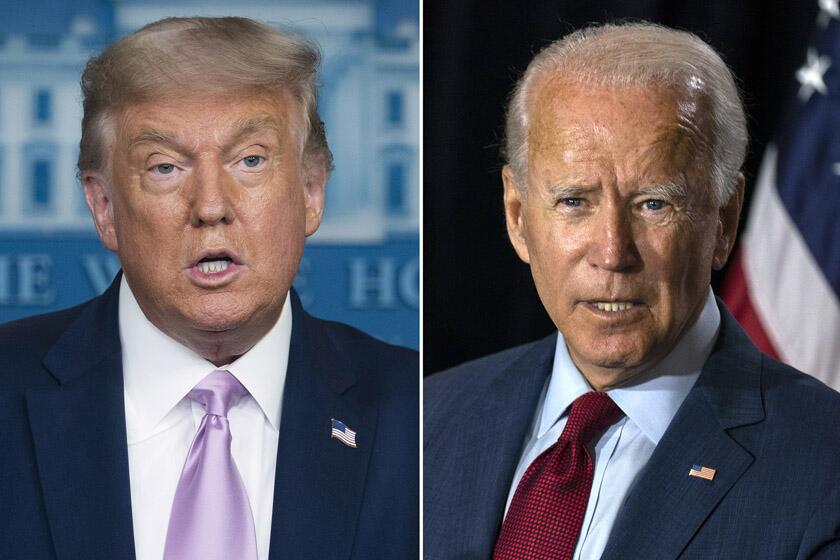Nikki Haley, potential 2024 GOP candidate, defends Trump at Republican convention

Former United Nations Ambassador Nikki Haley, a potential 2024 GOP presidential candidate, defended President Trump’s stewardship of the economy and foreign policy on the opening night of the Republican National Convention.
She slashed at Democratic nominee Joe Biden, a moderate, as beholden to the most liberal wing of his party.
“Their vision for America is socialism. And we know that socialism has failed everywhere,” Haley said. “They want to tell Americans how to live, and what to think. They want a government takeover of healthcare. They want to ban fracking and kill millions of jobs.... But President Trump is leading a new era of opportunity.”
Since she first won election in 2010 to become South Carolina’s governor, Haley has been seen as a rising star in the GOP — one of its most prominent women and a rare person of color in a heavily white party. In June 2015, the mass shooting at a historic African American church in Charleston pushed her into the national spotlight. She joined lawmakers of both parties to call for the removal of the Confederate flag from the statehouse grounds and signed the legislation to do so.
Haley, 48, wove her biography into her speech as she touched upon her family’s immigrant background and her experience navigating the aftermath of the shooting.
“Our state came face to face with evil. A white supremacist walked into Mother Emanuel Church during Bible study. Twelve African Americans pulled up a chair and prayed with him for an hour. Then he began to shoot,” Haley said. “After that horrific tragedy, we didn’t turn against each other. We came together — black and white, Democrat and Republican. Together, we made the hard choices needed to heal — and removed a divisive symbol, peacefully and respectfully.”
Haley said the moment should give Americans hope. Unstated was that Trump has spoken out in favor of keeping Confederate flags and monuments in public venues. It’s not the first time Haley has contradicted the president.
At a convention dominated by speakers who have shown unswerving loyalty to Trump, Haley stands out for having occasionally voiced some mild criticism.
A look at where President Trump and Joe Biden stand on key issues in the 2020 election, including healthcare, immigration, police reform and climate.
Like many prominent Republicans, Haley tangled with Trump before he became the party’s nominee. In the lead-up to the 2016 South Carolina primary, she called on Trump to release his tax returns. In response, Trump tweeted, “The people of South Carolina are embarrassed by Nikki Haley!” and Haley responded with the Southern dagger, “Bless your heart.”
Once Trump became the nominee, however, Haley joined the parade of Republican figures who fell into line behind him. In return, Trump nominated Haley to be the U.S. ambassador to the United Nations.
As a member of Trump’s Cabinet, Haley largely agreed with Trump on policy, but at times distanced herself.
Most notably after Trump said there were “very fine people on both sides” at the white supremacist march in Charlottesville, Va., in 2017, Haley publicly said she had “had a personal conversation” with Trump about it. In her 2019 memoir she was more explicit, saying she had been “deeply disturbed” by Trump’s remarks.
In the memoir, “With All Due Respect,” Haley also wrote that former Secretary of State Rex Tillerson and former White House Chief of Staff John F. Kelly tried to recruit her to undermine the president, but that she had refused to do so because he was elected by the American people.
When Haley resigned at the end of 2018, Trump was effusive about her performance.
After she left office, Haley joined the board of Boeing. She resigned this year because she said she opposed the company’s request for a $60-billion government bailout. The resignation allowed her to distance herself from a bailout that could prove unpopular with Republican voters in future years.
“I cannot support a move to lean on the federal government for a stimulus or bailout that prioritizes our company over others and relies on taxpayers to guarantee our financial position,” she wrote in her resignation letter. “I have long held strong convictions that this is not the role of government.”
More to Read
Get the L.A. Times Politics newsletter
Deeply reported insights into legislation, politics and policy from Sacramento, Washington and beyond. In your inbox three times per week.
You may occasionally receive promotional content from the Los Angeles Times.












